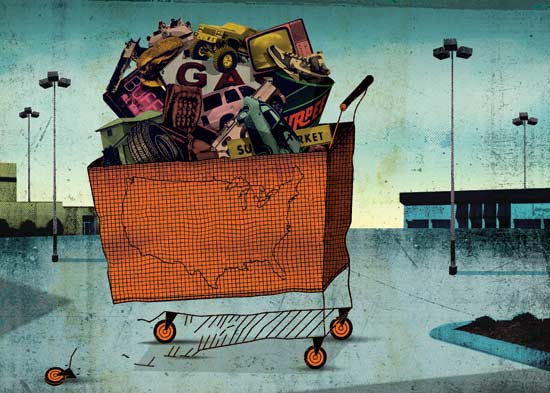Answers About the Future of America
Alums talk terrorism and hope for change with CAS Prof Andrew Bacevich

At the root of America’s financial crisis and its open-ended globalwar on terror, says iconoclastic conservative thinker and former Armycolonel Andrew Bacevich, lies a principle as old as America’s founding:freedom. In his latest book, The Limits of Power: The End of American Exceptionalism(Metropolitan Books, 2008), Bacevich argues that the meaning of freedomhas mutated in recent decades. Today, it stands for unbridledgovernment spending, conspicuous consumption, and “radical individualautonomy.” That new definition, he says, breeds crushing national andpersonal debt and dependence on foreign creditors and oil producers. Tosupport it all, we’ve needed an expansionist foreign policyrationalized by a centuries-old belief in American exceptionalism —that we are a special nation on a providential mission to spreadfreedom around the world. The kicker, he says, is that this samedefinition of freedom saps our ability to sustain the globalcommitments and conflicts that it engenders.
Bacevich, aCollege of Arts & Sciences professor of international relations,doesn’t have much hope that any president or political party willchange this equation. Late last year, he spoke with Bostonia about what he sees as the consequences of America’s particular brand of freedom; he then took e-mail questions from alumni readers. Excerpts from the Q&A are below.
Winslow Myers (CFA’68): Two of the best books I have read this year are yours and Three Cups of Tea.The strong interest in our country in the latter book may be especiallysignificant in light of your own analysis of our national character. Itis as if at least some of us, perhaps more of us than we think givenour election of Obama, long for another model of what it could mean tobe an American that gets out from under the wide umbrella of themilitary-industrial-media-church complex. This could be an opportunityto replace "The ends justify the means" with Martin Luther King’sformulation "The means are the ends in the making." What nascent ideasand movements in our country give you hope that we can change?
Bacevich: Ican’t say that I am especially hopeful. That Americans elected Obamabecause he promised "change" I readily concede. But what most peoplewant is "change" that leaves them undisturbed. They want the presidentto fix what’s broken without having to make any sacrifices. I don’t seethat as being in the cards. Real change will have to begin from thebottom up before it can come from the top down.
George L. Getchell, Col., USAF (Ret.) (ENG’54):Please expand on how you thinkPresident Obama can "attend primarily to repairing the wreckage left byhis predecessor," as you said in the interview with Bostonia.
Bacevich:Manythings to do. Here are three. First, reevaluate the global war onterror. Does global war make sense as an antidote to terror? Is itworking? Is it affordable? Second, demonstrate that the United Statesintends to be a global "good neighbor" rather than a nag instructingothers how to run their affairs. This means acknowledging thelegitimacy of concerns that other nations express. Climate change isone issue where we can begin to show our neighborliness. Three,abrogate the Bush Doctrine of preventive war. Force should be used onlyas a last resort — that should apply to the United States as much as to any othernation.
Joseph Brownrigg (STH’67,’76):Mostof the questions on foreign policy on Obama’s Web site were concerningPalestine-Israel … and all of those questions were in favor of greaterjustice for the Palestinians. Yet both political parties here try tooutdo each other and AIPAC (American Israel Public Affairs Committee) in unquestioning support for Israel. Aletter I wrote to Bostonia a few years ago was edited to reflect apro-Israeli slant. It is impossible to criticize Israel without one’sself and one’s employment being jeopardized. What changes should bemade in our foreign policy with regard to the Palestinians and Israel?
Bacevich:Thereis no magical solution to the Palestinian-Israeli dispute. Obama’selevation to the presidency doesn’t change that essential fact. My onemodest suggestion is that the United States acknowledge openly andcandidly that when it comes to Palestine, U.S. and Israeli interests havediverged. Maintaining the pretense that we share the same interests isfalse and counterproductive.
Chris Grande (GSM’06):Inyour opinion, where do we draw the line between getting involved inforeign disputes and letting things happen? Should we go all one way orthe other? Should we say, "It depends," which gives us impetus to do aswe please? How best do we formulate foreign policy for us in today’sworld? Thank you.
Bacevich:Thereis no clear-cut line. Just as we cannot run (or save) the world,we cannot withdraw from it. The best we can do is to be clear aboutwhere our interests lie and about how those interests change as theworld changes, while also being conscious of how limited our power is —not to mention our wisdom.
Katina Varmazis:Whatdo you believe Barack Obama should do about thePalestinian/Israeli issue? And where do you believe this matter shouldrank on his foreign policy agenda?
Bacevich:Itshould rank very high. But as I suggested above there’s not much he cando. The notion that we can bribe or bludgeon the two sides intosettling their differences is an illusion.
Comments & Discussion
Boston University moderates comments to facilitate an informed, substantive, civil conversation. Abusive, profane, self-promotional, misleading, incoherent or off-topic comments will be rejected. Moderators are staffed during regular business hours (EST) and can only accept comments written in English. Statistics or facts must include a citation or a link to the citation.